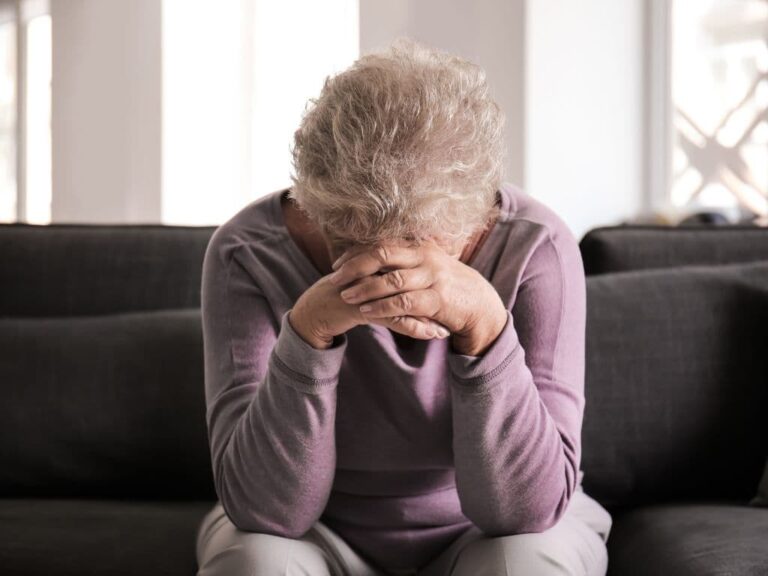Why Do Old People Get Grumpy?
As we age, it’s common for many older adults to become more irritable, cranky, and downright grumpy. There are a variety of factors that can contribute to increased feelings of anger, frustration, and overall grumpiness in one’s later years. Understanding the causes behind this shift in mood and outlook can help us support aging loved ones struggling with persistent irritability.
Older adults may become grumpy due to a variety of factors including health issues, hormonal changes, physical ailments, sensory loss, social isolation, financial hardship, and the loss of loved ones. These factors can lead to feelings of anger, frustration, depression, and loneliness. Addressing these underlying issues can help alleviate grumpiness in the elderly.

What Causes Grumpiness in Old Age?
There are many potential causes of grumpiness and irritability as we get older. Some of the most common contributors include:
How Does Anger and Frustration Contribute to Grumpiness in Old Age?
Feelings of anger and frustration are strong emotions that can certainly lead to increased grumpiness and general irritability in older adults. As our bodies start to fail and we face new limitations, it’s common to feel angry about our situation and frustrated by our inability to do things we used to do with ease. These feelings of exasperation can come out as generalized grumpiness.
How Do Mood Swings and Irritability Affect Older Adults?
Mood swings – sudden, unexplained changes in one’s emotional state – along with overall irritability are extremely common in old age. Hormonal changes, isolation, loss and other factors can leave elders feeling far more moody and prone to grouchiness. The littlest things seem to set off their temper. These frequent mood swings and lower tolerance for annoyances understandably leads to grumpy behavior.
What Role Does Depression Play in Old Age Grumpiness?
Depression can also be a major contributor to increased feelings of grumpiness and irritability in the elderly. As many as 7 million older adults suffer from depression, which often presents as persistent sadness, gloominess, feelings of hopelessness and frequent mood swings. This ongoing sense of gloom and despair can certainly lead depressed elders to seem withdrawn, sullen and downright grumpy.
How Does Dementia and Alzheimer’s Disease Influence Mood in Old Age?
Dementia – including Alzheimer’s disease, one of the most common forms – impacts 50% of people over 85. It often presents itself as memory loss, confusion and personality changes. Individuals with dementia frequently experience severe mood swings,appropriate anger, paranoia, and suspiciousness of others. This dramatically affects their mood and behavior, causing them to act in an irritable, cranky manner.
How Do Hormonal Changes Affect Mood and Irritability in Old Age?
The hormonal fluctuations of menopause in women and andropause in men can also lead to increased grumpiness and irritability as we age. Declining testosterone and estrogen levels are linked to mood instability. Mood swings, general crabbiness, and irritable behaviors are common symptoms of these age-related hormonal shifts.
How Do Physical Ailments and Chronic Pain Contribute to Grumpiness in Old Age?
Dealing with chronic pain and other physical ailments – common in older populations – can understandably put a damper on one’s mood. Conditions like arthritis, osteoporosis, and joint pain can lead to general feelings of misery, which comes out in the form of increased grumpiness and irritability. Hurt and immobility leads to frustration and anger.
How Does Hearing Loss and Vision Loss Impact Mood in Older Adults?
Age-related hearing and vision loss are additional contributors to elderly grumpiness. When we can’t fully engage with others or participate in activities we enjoy due to these impairments, it can lead to increased isolation, sadness and loneliness. These negative feelings often present as excessive grouchiness and lashing out.
How Does Social Isolation and Loneliness Contribute to Grumpiness in Old Age?
Research shows that prolonged isolation and loneliness in older adults can dramatically affect mood and behavior. We are social creatures, and lacking companionship and support frequently leads to feelings of depression, anxiety, anger and resentment – all precursors to grumpiness and general crabbiness.
How Does Financial Hardship Influence Mood and Irritability in Old Age?
Financial hardship and insecurity also play a role in elderly grumpiness levels. Many retirees struggle on fixed incomes, leading to constant worry and frustration over making ends meet. Ongoing stress over limited funds can certainly cause elders to be short-tempered and irritable.
How Does the Loss of Loved Ones Impact Mood in Old Age?
Finally, the extreme grief and mourning that comes with losing a spouse, family members and friends – something more common in advanced age – can dramatically impact mood. Profound sadness and feelings of loneliness in the wake of such loss often manifests as increased grouchiness and mood swings.
In summary, grumpiness and irritability in the elderly can stem from many sources – from health issues and neurocognitive conditions to psychosocial factors like isolation and loss. But there are ways we can help alleviate age-related grumpiness.
How Can We Help Older Adults Who Are Grumpy?
While we may not be able to cure all the potential sources of elderly grumpiness, there are supportive steps we can take to help minimize unnecessary grouchiness and ease difficult transitions in advanced age:
- Provide treatment for any underlying illnesses, including managing pain, vision/hearing loss and mental health issues like depression. This reduces discomfort and frustration.
- Encourage social engagement and community involvement to combat isolation and loneliness.
- Offer companionship and emotional support through organizations like elderly visiting programs.
- Help elders find purpose through volunteering, mentoring, classes, etc. This promotes self-worth.
- Assist with transportation needs to help older adults access social activities and medical care.
- Provide education to help seniors navigate aging, health conditions and healthcare. Knowledge is power.
- Discuss financial concerns and assist with budgeting, benefits and retirement planning to ease money woes.
- Listen with empathy, avoid taking grumpiness personally, and remind elders they are valued.
With understanding and targeted support, we can help minimize unnecessary grumpiness and irritability in our aging loved ones.
What Are the Signs and Symptoms of Depression in Older Adults?
It’s important to be able to recognize when grumpiness and mood changes may be more than just everyday irritability – but rather stem from depression. Common symptoms of depression in the elderly include:
- Persistent feelings of sadness, hopelessness, guilt and worthlessness
- A pessimistic outlook and frequent crying
- Fatigue and loss of motivation
- Withdrawing from social activities and isolation
- Insomnia or sleeping too much
- Appetite changes and unintended weight loss
- Aches, pains and other unexplained somatic complaints
- Memory issues and inability to concentrate
- Talks of death or suicide
- Mood swings, irritability and frequent anger
If an elderly loved one is exhibiting several of these symptoms, it’s important to have their mental health evaluated by a physician right away. Depression is highly treatable with medication, therapy and social support. Ignoring it can have tragic consequences.
How Can We Promote Social Engagement and Reduce Loneliness in Older Adults?
Since isolation and loneliness are major mood killers, taking steps to keep seniors socially engaged and connected with others is critical for supporting mental health. Some great ways to promote social contact include:
- Encouraging participation in senior community centers and activities
- Helping coordinate visits from family members and friends
- Utilizing volunteer visiting programs and companionship services
- Scheduling video calls andvirtual interactions when in-person visits aren’t possible
- Making introductions to other seniors in their community
- Assisting with transportation to social gatherings and events
- Involving elders in social hobbies like book clubs or crafting groups
- Utilizing technology like social media sites to stay connected from home
By facilitating social connections and ensuring older loved ones maintain bonds with family, friends and community, we can combat isolation and improve mood.
How Can We Help Older Adults Who Are Struggling Financially?
Money troubles are a huge contributor to stress, anger and sadness for many elderly individuals. We can help ease financial burdens by:
- Researching eligibility and assisting with applying for applicable aid programs like Medicaid, food stamps, utilities assistance, etc.
- Looking into senior service organizations that provide meals, medical equipment, and other services free of charge
- Helping organize financial paperwork and setting up bill pay options
- Having open talks about living expenses and creating an appropriate budget
- Setting elders up with senior discounts for phone, internet, entertainment, groceries, etc.
- Teaching seniors how to use sites like Craigslist to find free or cheap secondhand items
- Providing small, regular financial gifts like help with a utility bill
- Assisting with finding ways to supplement income, like participating in paid research studies
Even small gestures to ease financial burdens can help improve mood and minimize unnecessary grumpiness stemming from money woes.
How Can We Cope With the Loss of Loved Ones in Old Age?
Coping with grief and mourning is difficult at any age, but can be particularly devastating for elders who have lost most or all family members and friends. We can help them weather profound losses by:
- Making space for seniors to openly share memories and express their many emotions
- Avoiding minimizing their loss or rushing them through the grieving process
- Scheduling extra visits, calls, and check-ins during the most difficult times
- Reminiscing together about lost loved ones and looking at old photos
- Helping organize and participate in meaningful end-of-life rituals like funerals, memorials and the sharing of possessions
- Connecting seniors with grief support groups and mental health professionals when needed
- Helping elders celebrate holidays, birthdays, and other occasions that may now be difficult
- Inviting them into our own family celebrations and traditions
- Continuing to include them in the lives of remaining family and friends
- Helping fill the void of loss by involving seniors in new social circles and activities
While grumpiness caused by grief may be unavoidable at times, providing unconditional support and understanding through times of profound loss can help ease the burden for seniors.
In conclusion, while increased grumpiness and irritability can be part of the aging process, there are many things we can do to minimize unnecessary grouchiness in our elderly loved ones. Addressing any underlying medical issues, providing social and emotional support, easing financial burdens, and helping cope with loss and life transitions can help seniors maintain a more positive and contented outlook even in their later years. With some understanding and targeted assistance, the golden years don’t have to be quite so grumpy.
Frequently Asked Questions
-
Why do elderly get grumpy?
Medical science says that mood swings and depression in men are caused by a decrease in testosterone levels. According to Mayo Clinic, after age 40, testosterone levels in men decrease by 1 percent each year.
-
Why do senior citizens become irritable?
Normal aging can lead to depression and irritability. Maybe your friend has passed away recently. Perhaps they’re struggling to understand that the physical effects of ageing are making it more difficult to engage in hobbies and interests they once loved.
-
Why does my 93 year old mother sleep all the time?
Excessive daytime sleep can often be caused by boredom, depression and/or chronic pain. Problems with medication can also arise.
-
Can I leave my house to my child?
You, as a homeowner are allowed to gift your property to any of your family members at anytime, even though you still live there.
-
Why do elderly get angry so easily?
Anger can be a sign of depression, anxiety, grief or PTSD. Professional therapy may be necessary to help your loved one manage his/her emotions. Seniors may need medication for severe anger.
-
Why is technology important for elderly?
This study showed that older adults can benefit from social media use. Higher technology usage was linked to better health and fewer chronic conditions. It also led to lower levels of depression.
-
How far should a 65 year old walk every day?
In general, seniors in good health walk between 2,000 to 9,000 steps per day. These numbers translate into walking distances between 1 and 4 1/2 miles. Health benefits can be achieved by increasing the distance walked by approximately one mile.
-
Why do old people sleep less?
Your body’s production of growth hormone decreases with age. This will likely lead to a decline in deep or slow sleep, which is a particularly refreshing phase of your sleep cycle. This is because your body produces less melatonin. You’ll experience more sleep fragmentation and wake up more frequently during the night.
-
Why are old people always cold?
The natural decline in metabolism associated with aging can lead to a decrease in heat production, meaning seniors might not be able to keep their body at 98.6 degrees. A slower circulation may make it more difficult for the body to keep heat. It could also be caused by side effects of medication or aging.
-
How can I brighten up my nursing home?
When decorating your nursing home’s room, choose a theme. It is important to choose a theme for your nursing home room. This will allow you to bring in special wallpapers, photos frames, bedding and rugs as well as flowers. Hodgepodge is a great way to bring in different memories and elements into the space.







